Ely Culbertson -- If It Weren't For Him, We Might Not Play Bridge
Written by Howard Fosdick © BestFreeNewGames.com
Ely Culbertson almost single-handedly popularized Contract Bridge in the U.S. Yet few know that he was also a Russian revolutionary, itinerant card player, student of mass psychology, and influential peace activist. This is one of the few sites on the web to contain rules and complete coverage for the card game he invented called Jo-Jotte. Here is Culbertson’s surprising story...
Ely Culbertson was born in the Cossack region in the Caucasus mountains, then a part of the Russian Empire, in 1891. His father was an American who had gone to that country to find oil and became wealthy as a result. His mother was Cossack, a member of the proud warrior race of southern Russia.
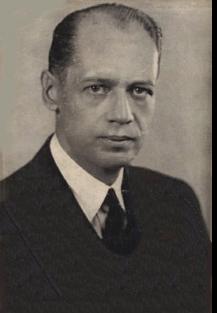
used in his popular Bridge books
from the 1930s
Young Ely was a child of privilege living in what was then a savage land. But he never felt he fit in. Perhaps it was his half-American parentage, perhaps it was his unbending ego, but Ely felt apart from "the masses" and always kept himself aloof.
In spite of his wealthy background, Ely become a Social Revolutionary and participated in the Russian revolution of 1905. With its failure, he became a wanted man, and then a political prisoner. While awaiting possible execution, he first became proficient at cards, playing the Russian game Vint. (Vint is a trick-taking game reminiscent of Whist).
After his parents secured his release, Ely traveled the world. He spent many years engaged in self-directed study at some of the best universities of Europe. His major interests were philosophy, the psychology of mass movements, and cards. It was in France that he learned Belote when that game was first becoming popular, just prior to the First World War. Culbertson later invented a two-player card game he named Jo-Jotte, which is based closely on Belote. Belote is still today considered the "national card game" of France.
The fall of the Russian Czar in 1917 left Ely suddenly penniless: his father had failed to diversify his wealth and had invested all of his money in Imperial Russian bonds. When Ely came to the United States to live about 1920, his financial position was precarious. He decided to make his living playing cards. He met his wife, Josephine, through cardplay at a New York club in the 1920's.
Ely tried unsuccessfully to make a living at card-playing and teaching (Auction) Bridge after marrying. When Contract Bridge arrived on the scene in the mid-1920's, Ely immediately saw its potential. He tried to convince the leading card experts to let him work for them in popularizing Contract. Milton Work and Wilbur Whitehead were little interested in his offer. They were the recognized authorities at Auction and their Auction books brought them significant income. When both rejected his entreaties, Ely realized he would have to popularize Contract Bridge -- and himself -- alone.
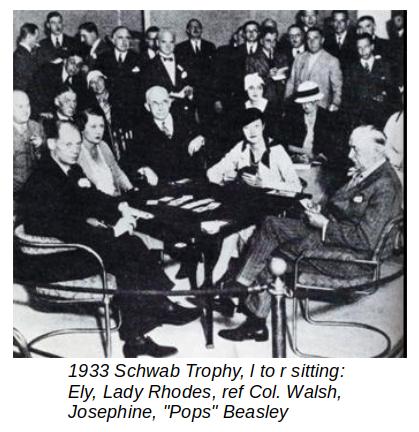
At this point his varied background came to full fruition. His knowledge of revolutions and mass movements translated easily into what we today call "mass marketing;" his study of psychology reinforced the same; and, his knowledge of card play and statistics made him one of the better players in the country. In short order, Ely backed the greats of bridge into widely-publicized matches against him and his wife. He utilized the new medium of radio to ensure a nationwide audience. And in 1931, he sealed his reputation as the foremost expert on Contract Bridge -- as well as the popularity of the game itself -- when he and Josephine defeated Sidney Lenz and Oswald Jacoby in a highly-publicized match. The match seized public interest in the U.S. and was reported on daily in the newspapers and radio.
Ely was a supreme salesman, for Contract Bridge and for himself. The popularity of one buttressed the other. As Contract Bridge became ever more popular, Ely made more and more money from his Bridge books, his endorsements, and similar activities.
A key part of Ely's success was in selling himself and his wife as a human-interest story for the media. He painted himself as an egotistical but misunderstood card genius. He took full advantage of the prejudices of the day, when most people saw women as intellectually inferior. Josephine was an excellent bridge player and their partnership understanding was unique in its day. Culbertson played up every angle to maximize interest in the "Bridge showdowns" he orchestrated. In many ways these contests were much like the title boxing matches of the day. They were challenge matches that lacked any official imprimatur, yet the public accepted them as definitive. All achieved national publicity and interest.
The Culbertsons dominated the new game of Contract Bridge throughout the early and mid- thirties. They didn’t win every match they played, but they won the important ones, and they certainly received the most publicity. Ely’s bridge books became huge bestsellers.
Another Ely venture involved the earliest plastic playing cards. After excruciating negotiations, he finally signed up with KEM Playing Cards to produce the first fully plastic playing cards. Regular playing cards are made from paper that is plastic-coated. Ely came up with the idea of entirely plastic (cellulose acetate) cards. These are more durable and are waterproof. KEM was eventually bought out by United States Playing Card Company, which still produces them today. At the time of writing, KEM are the official cards of World Series of Poker.
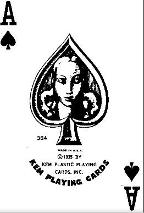
In 1937 Culbertson introduced his new card game Jo-Jotte. His idea was to popularize Jo-Jotte as the two-player equivalent of Contract Bridge. Ely modeled Jo-Jotte on the French two-hander Belote, which he had played during the first World War in Paris. Culberton took Belote and grafted a Bridge-like scoring system onto the game. In contrast to his success with Contract Bridge, Jo-Jotte never became popular. Few experienced card players have even heard of the game today.
Jo-Jotte was not entirely original, since it was clearly modeled on Belote. The game is popular in various guises and under different names around the world. For example, the parent game is variously called Clobyosh, Clob, Klaberjass, Kalabrias, Bela, and Darda. So Ely was sure he had a winner in Jo-Jotte.
In fact, Jo-Jotte plays well and is a fascinating game. It's one of our favourites. But the rules to the game are complicated. If one already knows contract bridge, the scoring system will be instinctive. But for those who don't, scoring seems overly complicated at worst, or needlessly arcane at best.
(This web site contains the full rules of Jo-Jotte, which you’ll find here.)
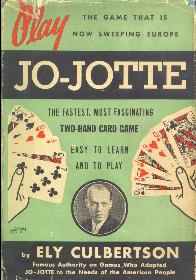
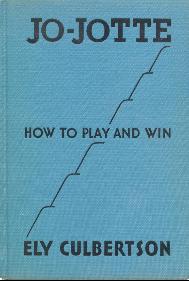
By the late 1930's, Culbertson faced a midlife crisis. His interest in card play wavered, and he wrote his autobiography: The Strange Lives of One Man (Winston: Chicago, 1940). He divorced his wife and left his two children to her care. He tried to find meaning in his old haunts in France, but to little avail. Eventually, he settled back in the U.S. He wrote several books on card play and games and married a college-age woman. The May-December marriage didn't last long.
Ely devoted much of his time and fortune to publicizing and promoting his personal plans for world peace in the late 40's and early 50's. At a time when cold war tensions were at their height, he felt uniquely qualified to show how to achieve peace. After all, he had grown up in Russia, lived in several countries, resided in the U.S., mastered several spoken languages, and studied politics and philosophy at leading European universities. Ely published widely-read articles on his peace plans in Reader’s Digest magazine, wrote two books on the subject, and testified before the U.S. Congress.
But his plans were not implemented as American foreign policy. In fact, he achieved much by getting a hearing for his ideas. But ultimately he didn't have the same success in influencing U.S. foreign policy as he had in getting the world to play Contract Bridge.
Culbertson died in 1954 from smoking-related lung disease. He was a complex man, one thought far too egotistical by some, while others believed it was all an act, a clever media-manipulation ploy created to achieve renown and financial success. Ely seems to have failed as a family man, divorcing his wife and negatively impacting his daughter's life. Yet he truly believed he could give back to the world through his peace plans during the cold war, and he backed up this belief with the totality of his fortune. And while a few may argue it would have happened without him, there is no question that he single-handedly popularized Contract Bridge.
For more information on Ely Culberston, read his autobiography, which is available at many big-city libraries in the U.S. Or see Culbertson: The Man Who Made Contract Bridge by John Clay (Weidenfield, 1983) or The Golden Age of Contract Bridge by David Daniels (Stein & Day: NY, 1980).
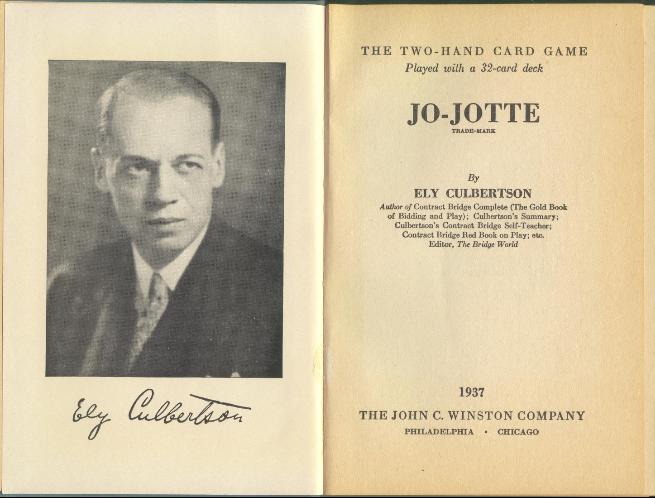
Here’s Bridge expert Al Sobel on the invention of Jo-Jotte, the two-hander invented by Ely Culbertson to complement four-handed Bridge in the late 1930’s...
“It was my second day with the Bridge World, and Ely [Culberston] blew into my office with the force of a hurricane. "Al," he hurricaned, "I'm going to write a book about Joe Jott. I understand you're familiar with the subject and I want you to do the research work. I want a full investigation of all the facts, and have your report ready when I get back from Budapest in three weeks."
"Fine," I countered. "But Ely, about the matter of my salary, you ..."
"Stop worrying about your salary. My boat sails in two hours and I don't have time to discuss it now. Draw whatever money you need from the cashier and we'll straighten it out later."
Incidentally, I might add that that was the last conversation I ever had with Ely regarding my salary! The cashier, the bookkeeper, the accountants, the comptroller, the Treasury Department, and Al Morehead (Ely's right bower at the time) tried to straighten the thing out but Ely washed his hands of the whole affair. But to get back to my first assignment. Ely shook hands, bid me farewell, and headed for the door. I halted him with, "By the way, boss, who is Joe Jott?"
He stopped like a blown-out hurricane, looked at me pityingly, and softly informed me, "Joe-jotte isn't a 'who.' It's a new card game. In fact, it's the greatest two-handed game in the history of the world (this statement was made before Dr. Kinsey published his first report). The book will sell like hotcakes." "Thank you," I meekly replied, "I'll get to work on it at once."
After I discovered that Jo-jotte was nothing but an old Hungarian game called Kalabrias with Culbertsonian trimmings, the assignment was not too difficult. I visited every New York coffee house, the native habitat of "Klob" enthusiasts, and played the game with the experts every night, much to the detriment of my financial standing. But I figured that my losses could be written up as legitimate expenses in connection with research.
When I brought this matter up at a later date Ely looked at me sternly and warned me that he did not tolerate gambling on the part of Bridge World employees. Thus ended the first lesson. But you've got to give him credit - he called the turn when he predicted the book would sell like hotcakes. If only it had sold like books!”
This first-person account was written by Al Sobel for the 25th anniversary of Bridge World Magazine (as quoted by Jerome S Machlin in his book "Tournament Bridge - An Uncensored Memoir"). The quote was forwarded to us by John McLeod, internationally-known card expert and webmaster of Pagat.com - Card Game Rules.
-----------------------------------
License: Feel free to print, copy, and distribute these rules, so long as you retain this paragraph. Written by Howard Fosdick © 2023, distributed under Creative Commons License BY-ND. HOME